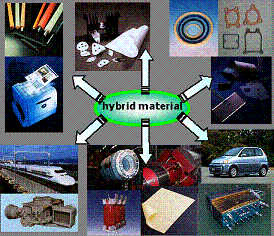Organic Electronics laboratory
[Japanese]
 Professor
Shuhei NAKAMURA
Professor
Shuhei NAKAMURA
sn@elec.mie-u.ac.jp
Associate Professor
Tatsunosuke MATSUI
matsui@elec.mie-u.ac.jp
Associate Prof.
Yusuke AOKI
yaoki@elec.mie-u.ac.jp
Condensed matter electronics laboratory Home Page (under construction)
Now organic materials such as plastics, rubbers, etc. are used widely for electrical and
electronic materials in our life.
In Condensed Matter Electronics Laboratory, we are studying the electrical insulating and mechanical
properties of organic/inorganic composite materials and organic/inorganic hybrids,
and their industrial application.
1. Research on Composite Materials as a Complex System
We have been investigating the electrical and mechanical properties of
composite materials made with polymer and fillers based on the percolation phenomena.
We have been developing composite separators and gasket of polymer electrolyte fuel cell.
2. Research on Heat-Resistive Materials and Their Application
Organic/inorganic hybrid materials made with polydimethylsiloxane and metal alkoxide
prepared through the sol-gel reaction have good electrical insulating and mechanical properties.
Thus, they have great potentials on electronic applications.
We have been developing heat-resistive elastic and electrical insulating materials and good
thermally conductive materials.
3. Non-Linear Phenomena
Degradation of electronic material is caused by a synergy effect through many mechanisms.
For example, water treeing in power cable grows by a combination of electric field and contaminated
water and gives a non-linear I-V characteristic.
The non-linear behavior gives us rich information if we apply a sound model to it.
Thus, how to make a sound model to explain a non-linear behavior such the power generation
performance of PEFC, water tree and resistivity of composites and so on is our study.
www-admin@elec.mie-u.ac.jp
 Professor
Shuhei NAKAMURA
Professor
Shuhei NAKAMURA